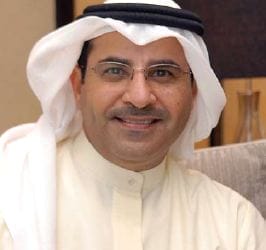“That is the thing about Wharton,” said Alshaya. “The School, with its alumni and faculty all over the world, makes it possible to connect with so many prominent people. Those ‘chance meetings,’ then, become not so much chance.”
Alshaya had just finished his studies at Kuwait University in the early 1980s and was starting in the family business, M.H. Alshaya Co., when a California executive came to do business with the company. He suggested Alshaya think about studying in the United States, particularly at Wharton.
“I came and looked, and it was the only place I applied to for my MBA in the United States,” said Alshaya, who entered the MBA program in 1982, after spending six months studying English to prepare. “It didn’t take long to realize I had made the right choice.”
Soon after visiting Wharton, Alshaya met Leonard Lauder, W’54, who told him to keep in touch. Today, his family conglomerate’s retail group is the biggest Estée Lauder franchisee in the Middle East.
“It was a transforming experience coming to Wharton. I learned a lot, but I also made invaluable connections,” said Alshaya.
The family business dates back to 1890, and when Alshaya joined it, its holdings were primarily in real estate, hospitality, general trading, and car dealerships. Alshaya worked in New York for Morgan Stanley for a short time before coming home, but his time at Wharton made him recognize new opportunities. He rejoined the family business which had already a number of Mothercare stores, the leading children’s wear specialist from the United Kingdom, and after two years he was entrusted by the family to aggressively expand within the retail industry.
Today Alshaya is executive chairman of the company he has grown to include 16,000 retail employees in 1,750 stores in 20 different countries, representing over 50 brands. He has extended his family business’s reach beyond Kuwait to the whole Middle East, Turkey, Eastern Europe, and Russia.
Alshaya has grown his Wharton connections as well. When Wharton expanded the European Executive Board to include the Middle East and Africa, Alshaya was invited immediately. Earlier this year, at the Dean’s request Alshaya agreed to take on the additional responsibility of serving on Wharton’s Board of Overseers, along with chairing the 2009 Wharton Global Alumni Forum in Dubai.
“It is perfect that the Forum is in Dubai,” said Alshaya. “There is a great mix of nationalities and cultures in a place that has quickly transformed from a small town to a world-renowned city. Sheikh Mohammed [the Emirate’s ruler] is also one of the few people who do business and politics well.”
Alshaya says it is important that American business schools use the Middle East as a resource for smart students, and he feels that Wharton is in the vanguard here.
“It is one of the few business schools with such a concentration of international students, which is the right thing,” he says, noting that he has hired five Wharton graduates in recent years. “The business world is international now. One of the things I foresee is fewer people going into finance and investment banking, certainly, and more into the real economy. Wharton taught me a lot about both, and I believe it will continue to do it well.”
As Wharton broadens its global initiatives in the Middle East, Dean Robertson expects Alshaya to play a critical role. “Mohammed is one of the most influential business leaders in the region,” said Dean Robertson. “His leadership will be a tremendous asset to the School in the coming years.”
Alshaya himself is bullish about business in the Middle East, despite recent economic developments.
“Here there is confidence that, for expansion, it is still a good time,” said Alshaya, who has recently done new deals with Payless Shoes, Express, and Office Depot. “The Gulf Region should not be dependent on oil, but should invest more in tourism and services. I don’t say we are immune, but I am hopeful that things are stable here, and that our human capital is getting better and better.”


























